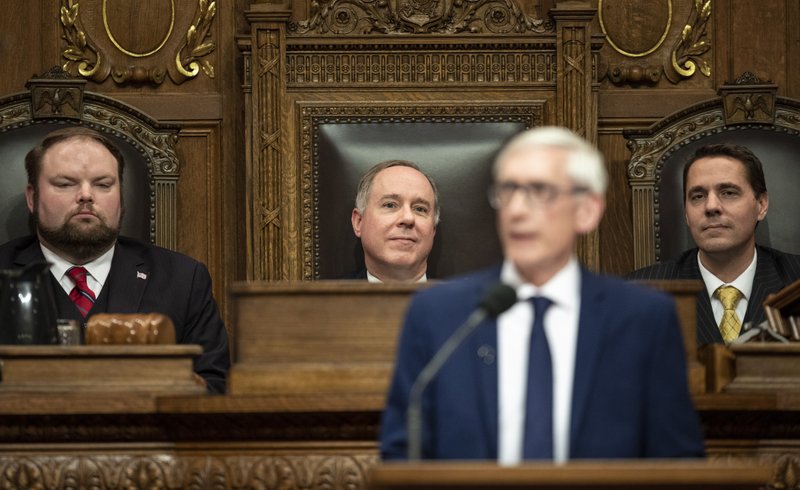Politics
Evers calls for bipartisanship to address Wisconsin issues

MADISON, Wis. (AP) — Democratic Wisconsin Gov. Tony Evers, in his first State of the State speech Tuesday, called on the Republican-controlled Legislature to scale back a corporate tax credit program to pay for middle class income tax cuts, “sacrifice” to find a bipartisan solution for road funding and work together to bolster spending for schools to help close the achievement gap.
“The realities we face are bigger than me or any political party,” Evers said in his speech as prepared for delivery. “The magnitude of our challenges requires us to put people first because, as I’ve said, that is the promise of our service.”
Evers said he expected solutions addressing the issues to pass “with broad support and in the spirit of bipartisanship.”
That doesn’t appear likely, with Republican leaders calling the speech “disappointing.” They vowed to oppose some of Evers’ top priorities, including expanding Medicaid and paying for the income tax cut by capping corporate tax credits.
“I am disappointed by today but hopefully tomorrow he begins the process of actually looking at the areas we could work together on,” Republican Assembly Speaker Robin Vos said.
In a move causing further unrest, Evers sent Attorney General Josh Kaul a letter withdrawing the authority given by former Gov. Scott Walker to have Wisconsin join a multistate lawsuit seeking repeal of the federal Affordable Care Act.
Evers’ order appears to fly in the face of a Republican-passed law during last month’s lame-duck legislative session that requires the Legislature to sign off on leaving the lawsuit. Evers did not explain in the speech how his order would be lawful.
Kaul, who applauded when Evers announced the move in his speech, was noncommittal after the address. Kaul said he would promptly respond and “take action consistent with the law.”
Vos said it would be illegal for Kaul to withdraw from the lawsuit without approval of the Legislature.
The governor also called for expanding Medicaid coverage to about 76,000 more poor people, relying on federal money to save the state about $180 million a year. Republicans have long opposed accepting the federal Medicaid expansion, and Fitzgerald said Evers should “give up on it.”
Both Evers and Assembly Republicans have proposed cutting income taxes by 10 percent, but they disagree on how to do it. Evers wants to scale back a manufacturing and agriculture tax credit program Republicans support. GOP lawmakers instead want to tap reserves to pay for a tax cut targeting the middle class.
Evers said the Republican approach was unsustainable.
“I don’t make promises I can’t keep, and I’m not going to propose things that we can’t pay for,” he said.
Republicans said they liked the proposal to cut income taxes, but wouldn’t pay for it the way Evers wants.
“He has a lot of good ideas that we’d like to do,” said Republican Sen. Alberta Darling, co-chair of the Legislature’s budget committee. “The issue is how are we going to pay for it?”
Evers also called for increasing the state’s share of funding for K-12 schools to two-thirds of costs. He wants to increase funding for K-12 schools by $1.4 billion over the next two years, but Republicans have balked at the price tag.
Evers said his budget would include $600 million for special education funding. He also pledged to “get to work” on closing the achievement gap for low-income and non-white students.
On transportation, Evers called for “sacrifices and compromises to find a long-term, comprehensive solution that works for everyone.” He has yet to propose a plan or amount of funding, but he’s previously said he’s open to raising gas taxes.
Evers also pledged to tackle lead drinking water lines, saying he will soon sign an executive order to designate a person within the state Department of Health Services to take charge of the issue and to help secure federal funding for prevention and treatment programs.
The Democratic governor and the Republicans who control the Assembly 63-35 and the Senate 19-14 have gotten off to a rocky start.
Republicans met in a lame-duck special session last month to weaken Evers’ powers before he took office, a move Evers and other Democrats decried as a power grab.
GOP leaders, in another move designed to reduce Evers’ control, are also talking about breaking with tradition to write their own state budget, instead of working off what Evers will propose likely in late February.
Evers said he wants lawmakers to take up his version of the budget rather than creating their own. He has said he would consider vetoing the entire budget if Republicans summarily reject what he proposes.
Fixing the economy is also a priority, Evers said, and he referenced his calling on the Wisconsin Economic Development Corporation to create an innovation and entrepreneurship committee to work with entrepreneurs and support innovation. He said Wisconsin has fallen behind on broadband internet expansion, small-business creation and keeping health care costs down.
Evers campaigned on dissolving the economic development agency created under Walker, but since his victory has reversed position and said he won’t propose any organizational changes.
Follow Scott Bauer on Twitter: https://twitter.com/sbauerAP







